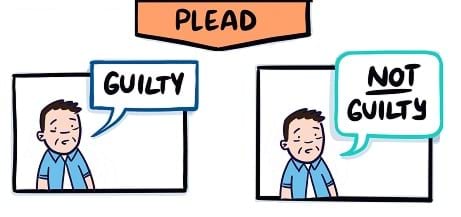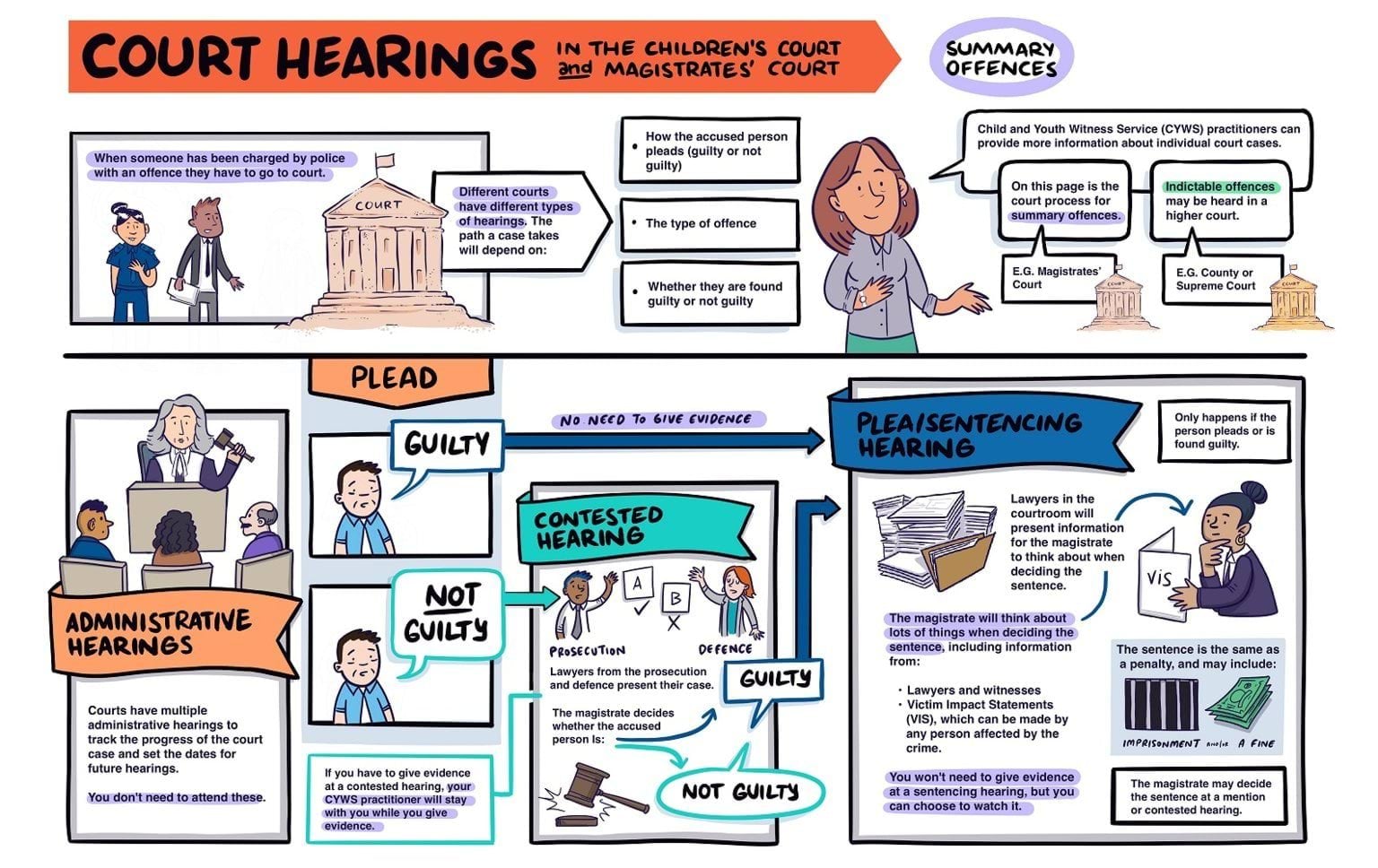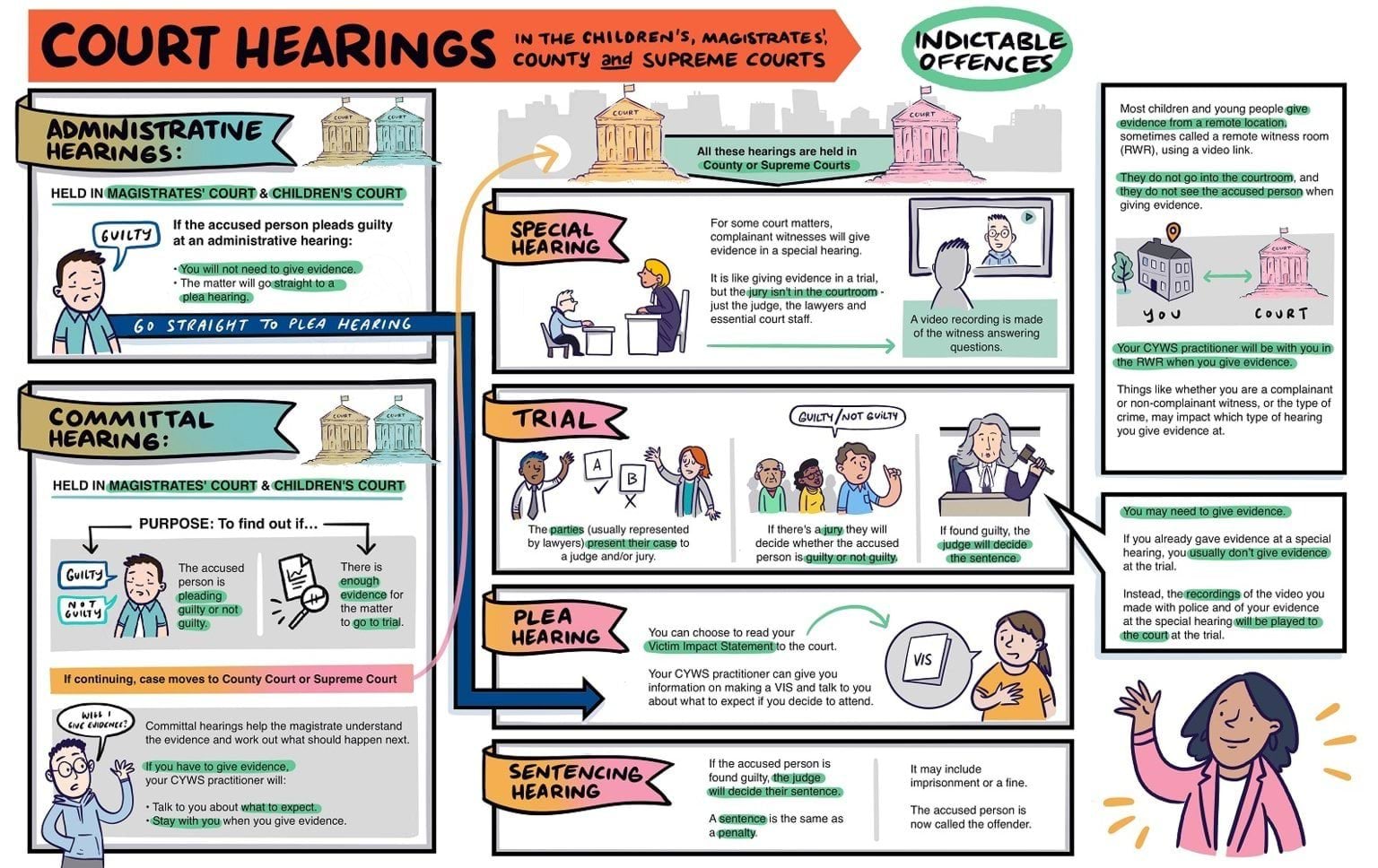About court hearings
At a court hearing lawyers present information to a judge or magistrate, usually in a courtroom.
There are different types of hearings:
- There are administrative hearings that help the magistrate or judge keep track of what has happened and set dates for things that still need to happen. Witnesses do not need to attend.
- There are other hearings where witnesses give their evidence in court.
When a witness gives evidence, they tell the court what they know by answering questions.
The accused person can plead guilty at any time. If this happens before you give evidence, then you will not have to give evidence.
Giving evidence in a hearing
The type of hearing you give evidence at can depend on:
- whether the crime happened to you (you are a complainant witness) or to somebody else (you are a non-complainant witness)
- the type of crime.
Your CYWS practitioner will talk to you about whether you are a complainant or non-complainant witness and the hearings that are relevant to you.
As a witness you might give evidence in the:
- Magistrates’ Court at a contested hearing (for summary offences) or at a committal hearing (for indictable offences)
- County Court or Supreme Court at a trial (indictable offences).
Court hearings for summary offences
Courts have multiple administrative hearings to track the progress of the court case and set the dates for future hearings.
You don’t need to attend these.
If the accused person pleads guilty at an administrative hearing, you won’t need to give evidence. The matter will go straight to a plea/sentencing hearing.
If the accused person pleads not guilty, there will be a contested hearing.
If you have to give evidence at a contested hearing, your CYWS practitioner will stay with you while you give evidence.
Lawyers from the prosecution and defence present their case.
The magistrate decides whether the accused person is guilty or not guilty.
Lawyers in the courtroom will present information for the magistrate to think about when deciding the sentence.
The magistrate will think about lots of things when deciding the sentence, including information from:
- lawyers and witnesses
- Victim Impact Statements (VIS), which can be made by any person affected by the crime.
You won’t need to give evidence at a sentencing hearing, but you can choose to watch it.
The sentence is the same as a penalty, and may include imprisonment and/or a fine.
Plea/sentencing hearings only happen if the person pleads guilty or is found guilty.
For summary offences, the magistrate may decide the sentence at a mention or contested hearing.
Court hearings for indictable offences
Held in Magistrates’ Court and Children’s Court
If the accused person pleads guilty at an administrative hearing:
- You will not need to give evidence.
- The matter will go straight to a plea hearing.
Held in Magistrates’ Court and Children’s Court
Purpose is to find out if:
- The accused person is pleading guilty or not guilty.
- There is enough evidence for the matter to go to trial.
Committal hearings help the magistrate understand the evidence and work out what should happen next.
If you have to give evidence, your CYWS practitioner will:
- Talk to you about what to expect.
- Stay with you when you give evidence.
If continuing, the case moves to the County Court or Supreme Court.
For some court matters, complainant witnesses will give evidence in a special hearing.
It is like giving evidence in a trial, but the jury isn’t in the courtroom – just the judge, the lawyers and essential court staff.
A video recording is made of the witness answering questions.
The parties (usually represented by lawyers) present their case to a judge and/or jury.
If there’s a jury they will decide whether the accused person is guilty or not guilty.
If found guilty, the judge will decide the sentence.
You may need to give evidence.
If you already gave evidence at a special hearing, you usually don’t give evidence at the trial.
Instead, the recordings of the video you made with police and of your evidence at the special hearing will be played to the court at the trial.
If the accused person pleads guilty or is found guilty, the lawyers in the courtroom will present information for the judge to think about when deciding the sentence.
If you have made a Victim Impact Statement (VIS), you can choose to read your VIS to the court, or to have someone else read it for you.
Your CYWS practitioner can give you information on making a VIS and talk to you about what to expect if you decide to attend.
If the accused person is found guilty, the judge will decide their sentence.
A sentence is the same as a penalty. It may include imprisonment or a fine.
The accused person is now called the offender.
Downloadable infographics: Court hearings
The infographics below show different types of court hearings and when they occur in the court process.
The first infographic shows the court process for summary offences. Below that is a second infographic, which shows the court process for indictable offences.
Updated











